Pinkerton: Democrats Confront the Mysteries of Afghanistan as They Run Interference for Biden’s Debacle
The Last Mistake in Afghanistan?
Probably a lot of Americans thought that the death of 13 American servicemen and women at the Kabul airport on August 26 would be the last tragic debacle of our Afghanistan misadventure. Indeed, perhaps some Americans felt a little better when they heard the news that the U.S. military had gotten its revenge on “terrorists,” taking out ten of them in one blow of a drone strike on August 29.
As one defense official said on the 29th of the dead and their droned vehicle, “It was loaded up and ready to go.” That is, they were terrorists and they had their suicide-vehicle aiming for an American target. For his part, on September 1, Gen. Mark Milley, chairman of the joint chiefs of staff, declared that the military had headed off an “imminent” threat, calling the strike “righteous.”
Without a doubt, the strike also made the Biden administration look tough after weeks of looking weak. Yes, Biden’s Hamptons-vacationing officials might have been caught unawares of the sudden slide of events in Afghanistan. Yet now, as we were finally leaving that country, at least we were showing macho by killing bad guys on the way out. Don’t mess with Sheriff Joe!
All these declarations of precision and righteousness were good enough for many in the Main Stream Media, who were happy to play stenographer to Pentagon spin doctors. Here, for example, is CNBC’s headline on August 29: “U.S. drone strikes an ISIS-K vehicle packed with explosives in Kabul.” We can note the simple presentation of “fact” here. This MSM outlet felt no need to insert any qualifying in the language, such as “reported” or “alleged.” That same day, Fox News, which is increasingly a part of the MSM, added these spoonfed-by-the-Pentagon “details”:
“Significant secondary explosions from the vehicle indicated the presence of a substantial amount of explosive material,” US military official says. No civilian casualties.
We now know that qualifying was much needed—and then some. On September 10, The New York Times reported that that the ten dead Afghans weren’t ISIS-K or any other kind of terrorist; instead, they were an innocent Afghan family, the father of which was working for an American NGO (non-governmental organization) devoted to food aid.
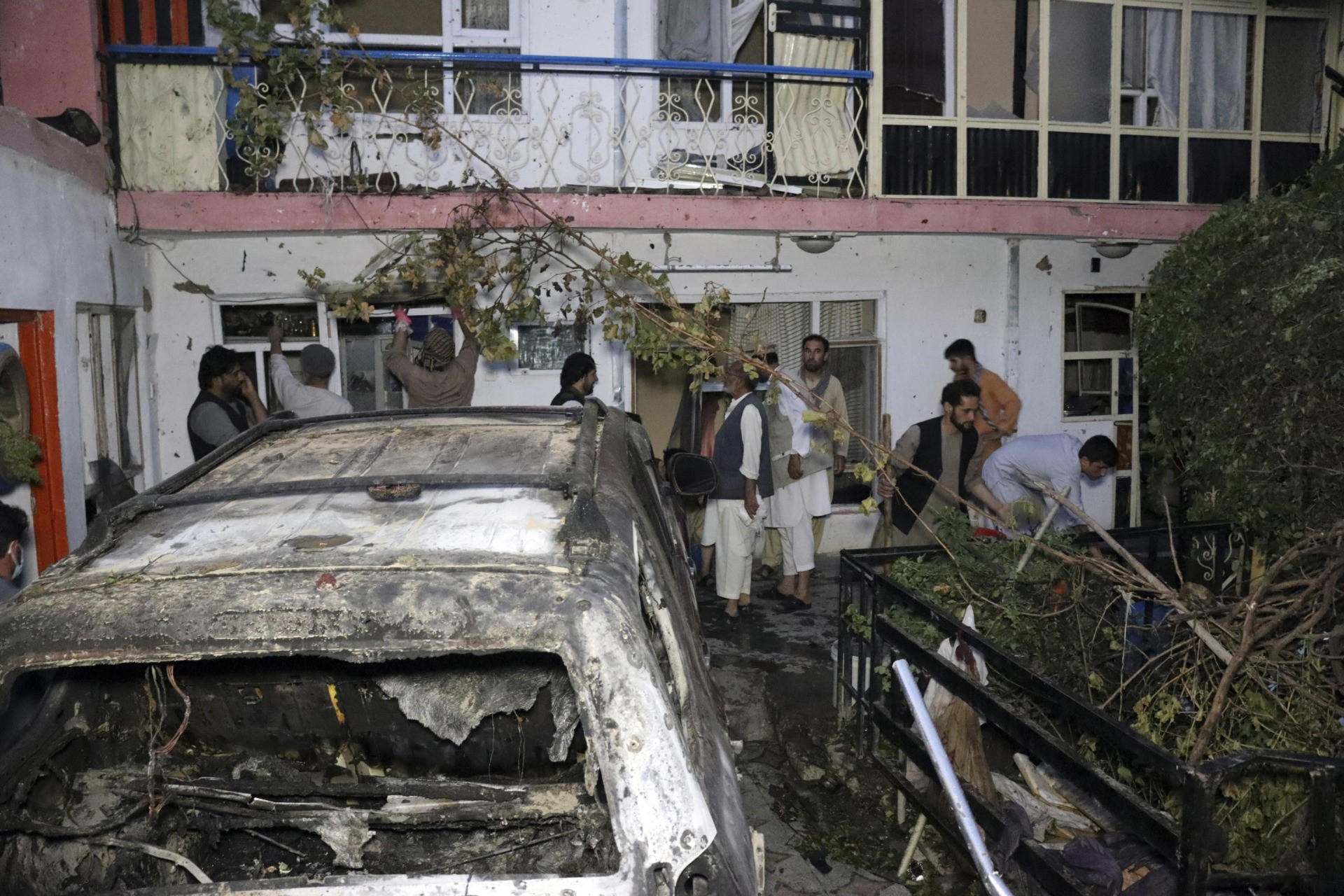
Afghans inspect damage done to the Ahmadi family home after a U.S. drone strike in Kabul, Afghanistan, on August 29. The Pentagon announced on September 17, 2021, that a review revealed that only civilians were killed in the drone strike, not an Islamic State extremist. (AP Photo/Khwaja Tawfiq Sediqi)

Emal Ahmadi shows a photo of his family member who was killed during a U.S. drone strike on their home in Kabul, Afghanistan. Ahmadi said the U.S. drone strike killed 10 members of his family, six of them children. (AP Photo/Khwaja Tawfiq Sediqi)

Emal Ahmadi shows a photo of another one of his 10 family members who was killed during a U.S. drone strike on their home in Kabul, Afghanistan. (AP Photo/Khwaja Tawfiq Sediqi)
To be sure, we were not obligated to believe the The New York Times, but the Pentagon’s initial defense was notably weak. And so a tweet from iconoclastic leftist Glenn Greenwald resonated:
An entire family in Afghanistan was extinguished to prevent Joe Biden from having to endure a news cycle accusing him of weakness in the face of the attack at Kabul Airport, accompanied by lies from his Pentagon/CIA and his media about who was killed.
Finally, on September 17, the Pentagon admitted that the drone strike had been a “tragic mistake” and extended its “sincere and profound condolences” to the survivors of the slain family.
Department of Defense / Twitter
The point here is not to rag on the Pentagon, at least not too much. For two decades now, our soldiers have been living through the fog of war, and as they say, war is hell. So while there obviously must be an investigation of what happened on the 29th—to say nothing of the inevitable payment to the Afghan family’s survivors—we must realize that true justice is not nailing some hapless captain or major who made a mistake in pulling the trigger and firing off that drone. That’s not justice at all, that’s just scapegoating.
Instead, true justice is going up the chain of command to answer obvious questions, including: Was there pressure from on high to find a target? And if there was such pressure, from how high? Did anyone see a drone strike as a way to “change the narrative” away from the airport disaster?
In the meantime, of course, even truer justice would be getting to the bottom of the policy mistakes that have been made these past two decades. It was those policy mistakes that made the tragic incidents of August 26 and August 29 inevitable.
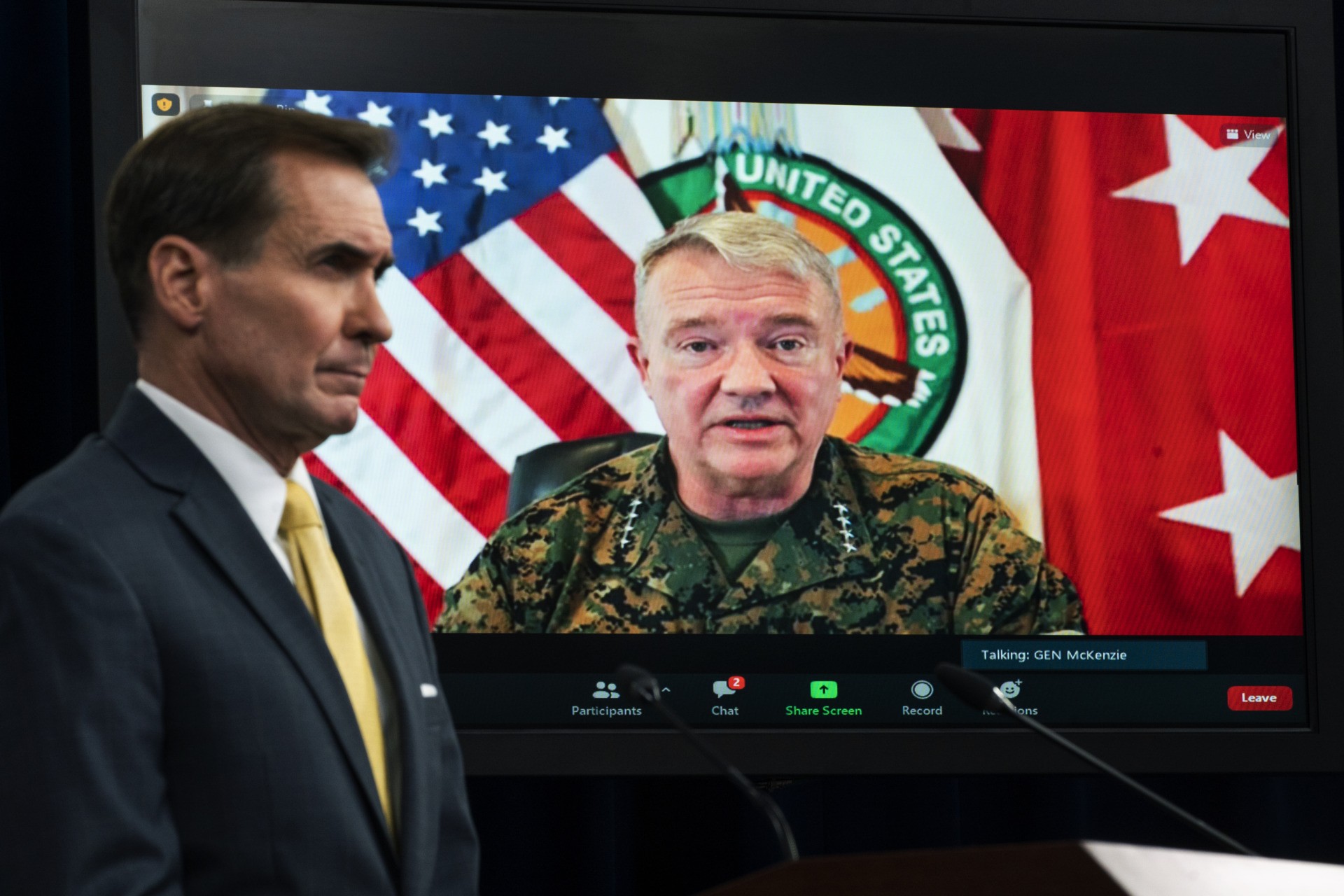
Gen. Frank McKenzie, Commander of U.S. Central Command, appears on screen during a virtual briefing moderated by Pentagon spokesman John Kirby in Washington. (AP Photo/Manuel Balce Ceneta)
So Congress has a lot of work to do. Under our Constitution, the legislative branch is supposed to have equal powers to the executive branch, and now would be a good time for the legislature to start reasserting its power.
To be sure, a full inquiry into the many mistakes made in Afghanistan will take years, even decades, and yet we should start with the mistakes made in the last few months.
After all, we are hardly out of the woods in Afghanistan; we don’t know how many American citizens have been left behind there, and we also don’t know how many Americans—in uniform, in civilian clothes, in native garb—are operating in Afghanistan today, doing everything maybe from rescuing to surveilling to rebel-arming.
The goal should never be to blow the cover of important covert missions, and yet at the same time, somebody other than the Biden Pentagon and CIA should have a real say in what’s being done in the name of the United States. As we’ve learned by now, if we do something stupid overseas, Americans on the homefront often end up paying the price. And without at least some degree of accountability, we can’t say for sure whether or not we’ve made our last tragic mistake in Afghanistan.
Unfortunately, Congress doesn’t seem all that interested in fully living up to its duty to fully check-and-balance the White House. Last week’s hearings were a discouraging reminder that the Democrats who lead Congress aren’t interested in doing much that would make a Democratic president look bad.
The Mystery of Biden Policy
In his testimony before the House Foreign Affairs Committee on September 13, and before the Senate Foreign Relations Committee the following day, Secretary of State Antony Blinken left as many questions unanswered as answered. And most top Democrats were okay with that.
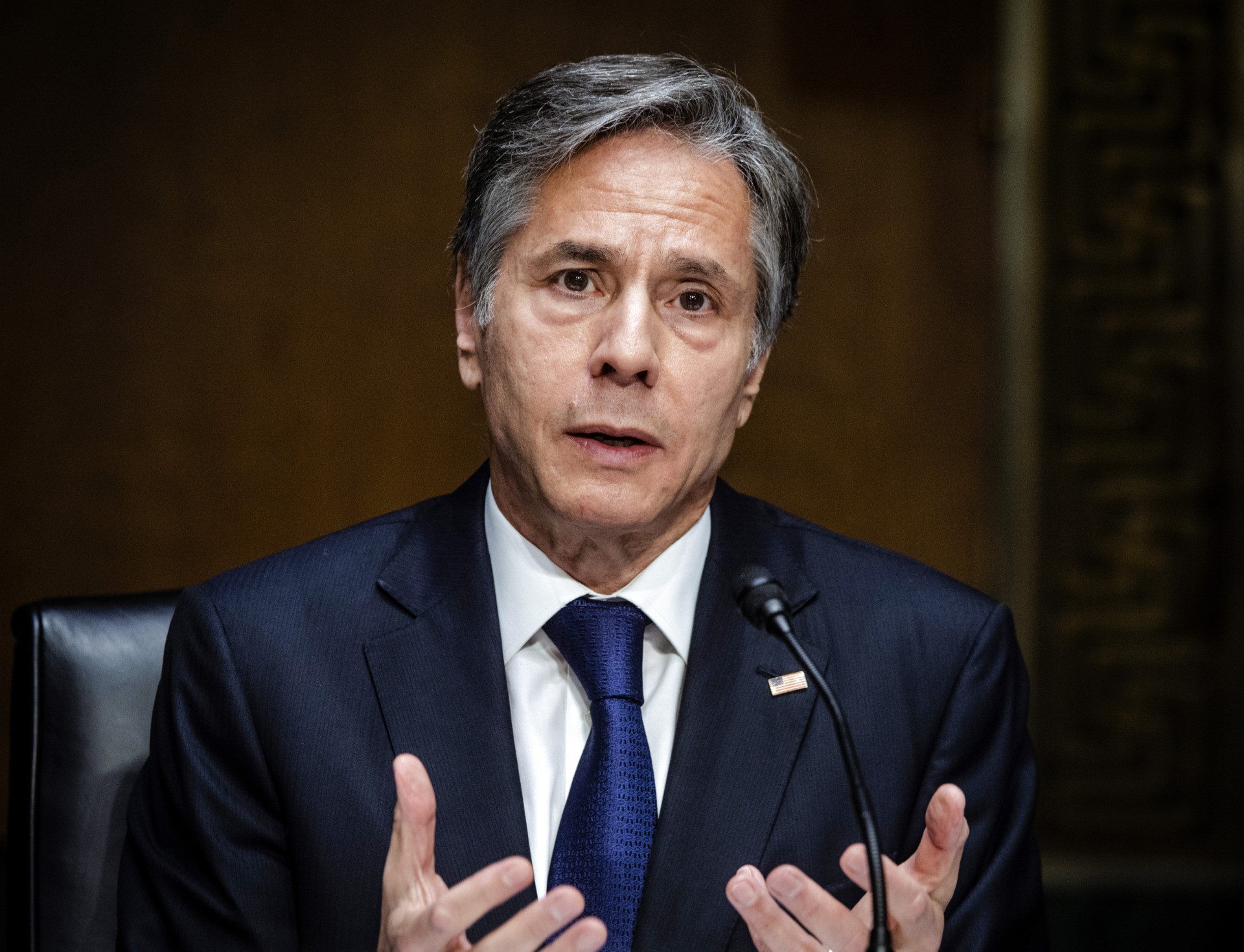
Secretary of State Antony Blinken testifies during a Senate Foreign Relations Committee hearing on September 14, 2021, on Capitol Hill in Washington. Blinken was questioned about the Biden administration’s handling of the U.S. withdraw from Afghanistan. (Jabin Botsford/Pool via AP)
As Blinken said in his opening statement on the 13th, “Even the most pessimistic assessments did not predict that government forces in Kabul would collapse while U.S. forces remained.” Well, of course, to really get answers to the mystery as to how we could get something so big so wrong, we’ll need to see all of those assessments and then also hear testimony under oath from the assessors themselves: Was it really your opinion that the Afghanistan government could stand on its own two feet? Were you in any way pressured to produce the answer the Biden administration wanted to hear? And so on.
And as for Blinken’s testimony on both days, the fog of mystery was hardly lifted. How many Americans are left in Afghanistan? About a hundred. What will happen to those Afghans who still wish to get out? We don’t know, and/or w’ll get back to you on that. Will we be sending aid to Afghanistan? Yes, but since we don’t have relations with the Taliban, the aid will be going through such channels as the United Nations and NGOs. Has Congress voted to approve such aid? Not really, no, but we’re doing it anyway; you see, we have shells to hide money than Congress has games to find it. Lotsa luck on the transparency and accountability! And of course, Blinken mumble-mumbled on that innocent-family drone strike.
House Foreign Affairs Committee
Moreover, on broader policy questions, such as whether or not the Biden administration had a plan for getting out of Afghanistan, Blinken said it did, but no thanks to the preceding Trump administration, which he said had left the Biden people with a deadline for withdrawal but no plan for withdrawing.
Here we might pause to observe that the Biden administration has been on the job since January 20; that might seem to have given them enough time to think up, if they wished to, their own new policy. In addition, the accusation that the Bidenites were left plan-less by their predecessors had already brought a strong rebuke from a former top Trump official. And the chairman of the Senate committee, Democrat Robert Menendez of New Jersey, said to Blinken, “the execution of the U.S. withdrawal as clearly and fatally flawed.” And in response to Blinken’s repeated attempts to put the best face on the situation, Sen. Ron Johnson (R-WI) scorned Blinken’s “detachment from reality,” while Sen. Jim Risch (R-ID) clapped back even harder: “There is not enough lipstick in the world to put on this pig to make it look any different.”
Yet perhaps most mysteriously, when Blinken was grilled on Monday by Rep. Scott Perry (R-PA) about whether or not he, Blinken, had been interviewed by the FBI in regard to Hunter Biden, the secretary of state answered, “It would not be appropriate for me to comment in a public forum on any legal proceedings that the [State] department—” And when Perry cut him off to repeat his question, Blinken closed up, “I’m not going to comment one way or another.” Whereupon the chairman of the committee, Rep. Gregory Meeks (D-NY), cut off Perry. In other words, the Democrat in Congress was running interference for the Democrat in the White House.
And so the potential for transparency slips back into the murk of mystery, leaving us tantalized about what Blinken and the State Department might not be telling us about Hunter Biden.
For his part, Perry has since said, “My concerns continue to escalate with regard to Secretary Blinken’s credibility and judgment. I was informed that the Secretary was interviewed by the FBI with regard to Hunter Biden, Barisma, and his Blue Star Strategies. The secretary’s response–and evident discomfort thereof–was very telling.” So, another mystery.
House Foreign Affairs Committee
Still, Blinken made one thing clear enough in his testimony: The mission in Afghanistan, at least the nation-building part of it, was always a forlorn fool’s errand. As he put it, “The idea of using military force to remake a society is something that is beyond our means and capacity.” That is, some missions are just mysteries to us; they are bridges too far.
So that’s the biggest mystery of all, and it’s a question still unanswered after Blinken’s two days of testimony. When all this began—when we shifted from a punitive expedition to Kabul to a nation-building mission in early 2002—what were we thinking? To be sure, that’s not a question that Blinken can answer; he has enough to answer for in his brief tenure.
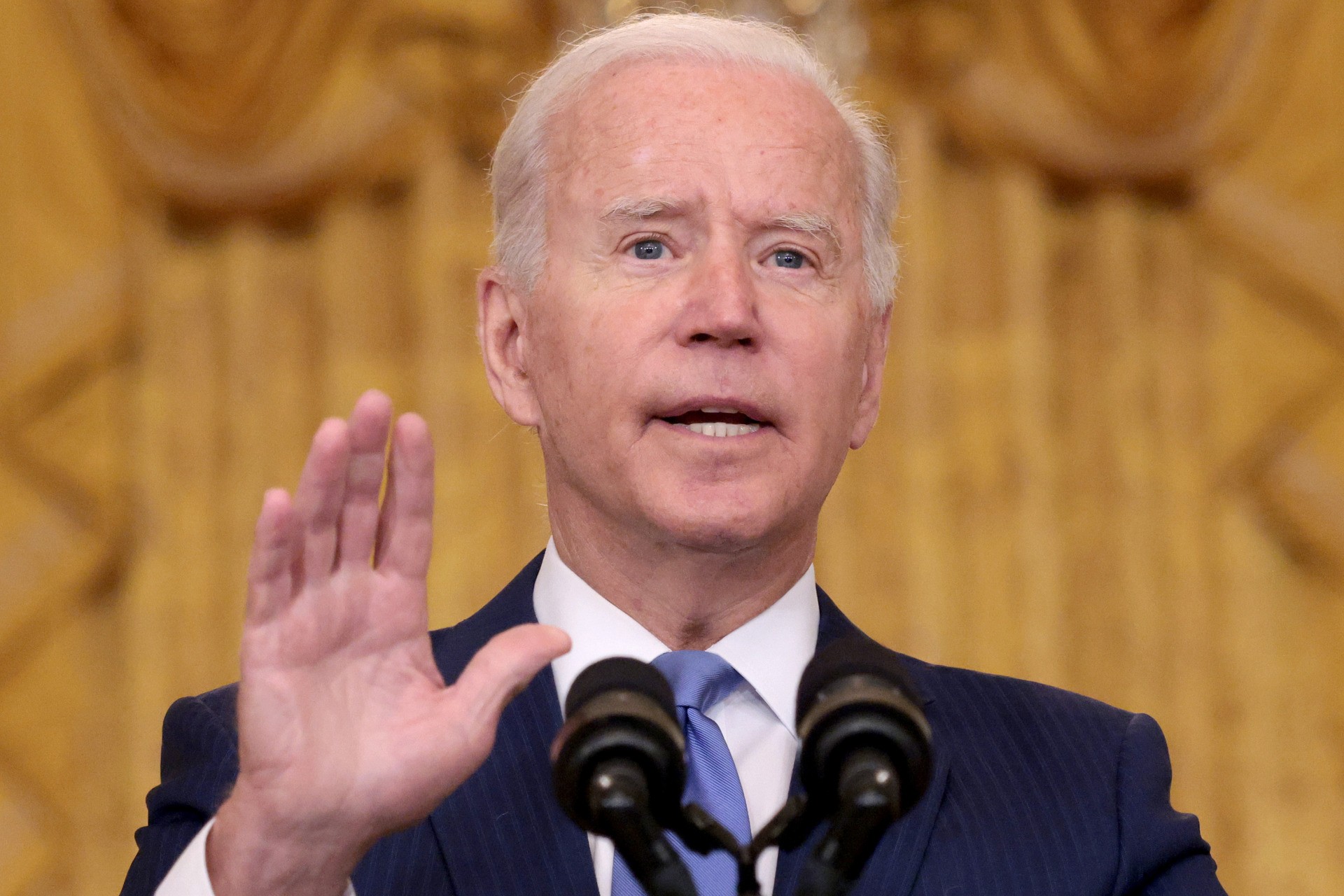
President Joe Biden speaks during an event in the East Room of the White House on September 16, 2021. (Win McNamee/Getty Images)
Blinken got through his two days of testimony without really a scratch. The Democrats in charge of the two foreign relations committees, House and Senate, are not, of course, looking to deal any hard blows to the Democrat in the White House.
So it will likely be awhile–perhaps in the 118th Congress in 2023, if oversight-minded Republicans win in the 2022 midterms–before we find answers to the many mysteries of this administration’s Afghanistan policy. Yet in the meantime, even without the benefit of subpoena power to help get answers, we can start to ask questions and seek to illuminate mysteries.
The Mystery of Diversity
For years now, we’ve been told that “diversity is our strength.” Well, maybe so in some circumstances, but maybe not in others. Obviously, diversity was no strength for us in Afghanistan.
Indeed, there’s the question of how the U.S. has confronted diversity around the world in all its “counter-terror” and “nation-building” operations over the last two decades.
And by “diverse,” I don’t mean different-colored faces on TV commercials or different funky restaurants around town or even lectures in classrooms or in the the workplace. I mean, diversity in the sense that different kinds of people really, truly, and sincerely think and act differently. That kind of diversity in a conflict setting can spell trouble because a military doesn’t flourish in the midst of mystery.
For instance, one of the reasons that the U.S. has had such a hard time dealing with suicide bombers—from Beirut in 1983 to 9/11/01 to Kabul in 2021—is that the concept is so alien, so mysterious, to our way of thinking. As the 9/11 Commission concluded in 2004, one of the key failures that led to the tragedy was a “failure of imagination.” And so a 1994 Tom Clancy novel, Debt of Honor, in which a character crashes a 747 jet into the U.S. Capitol, didn’t get security officials thinking sufficiently about suicide air attacks.
That is, Americans just couldn’t get inside the heads of the people who were willing to kill themselves to to kill us—and so even with all our high-tech, as recently as last month at the Kabul airport, we failed to have adequate countermeasures.
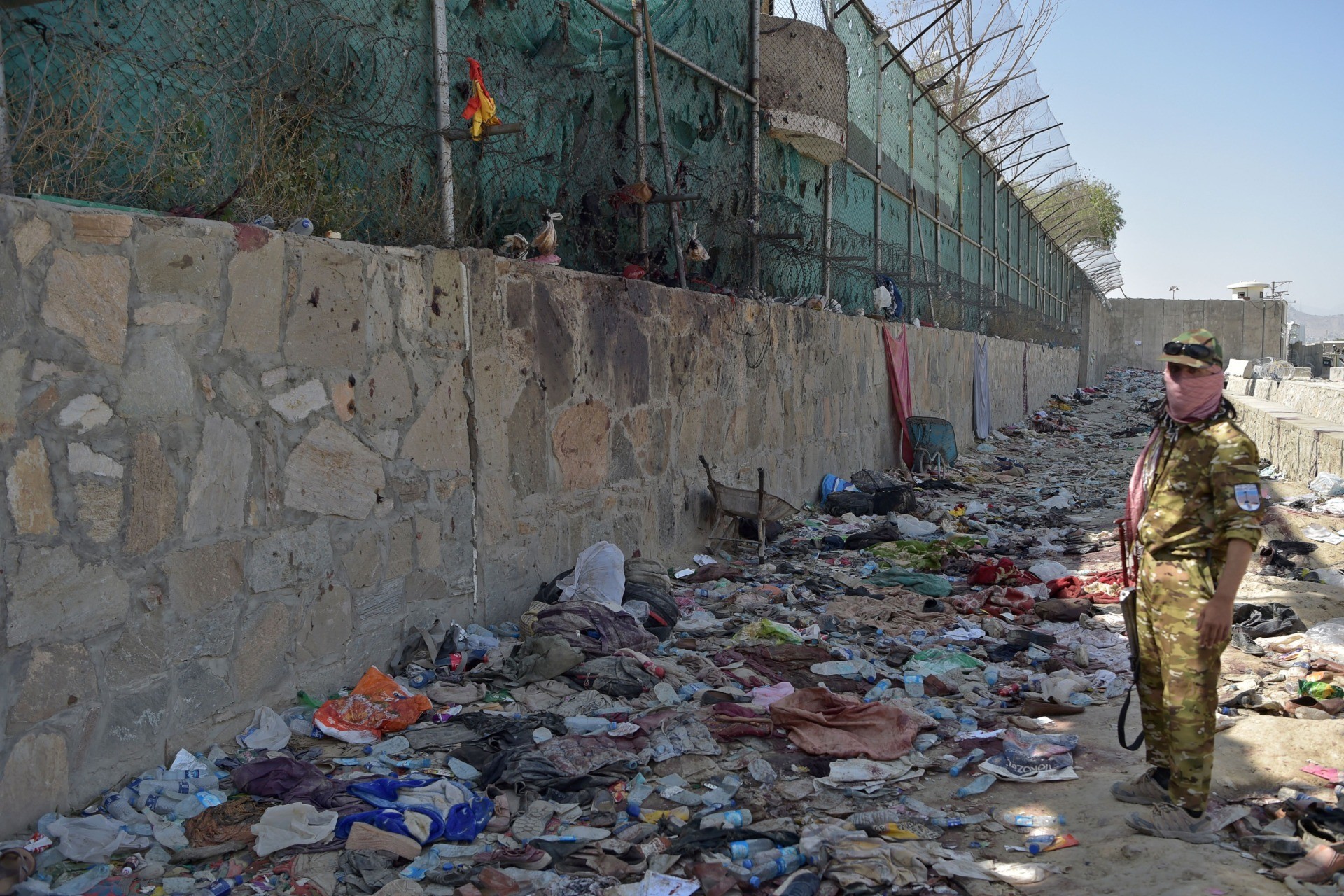
A Taliban fighter stands guard at the site of the August 26 twin suicide bombs, which killed scores of people including 13 US troops, at Kabul airport on August 27, 2021. (WAKIL KOHSAR/AFP via Getty Images)
Yes, for sure, the precautionary point about the world’s diversity applies to a certain country in Central Asia. You see, some Afghans are like us, sure, and plenty wish to move to America, for perhaps a variety of reasons. And yet still more Afghans like our stuff—especially our weapons. And yet probably most in Afghanistan have disliked, even hated, us; that’s why, at the peak of our military involvement in Afghanistan, we were losing 100 soldiers a year to insider attacks—that is, Afghans turning on us.
You see, diversity means that Afghans are entitled to their view that Americans are just another bunch of invaders—like the British in the 19th century, or the Soviets in the 20th century—and so we, too, belong in their graveyard of empires. That’s why they fought so hard to get us to leave, dead or alive.
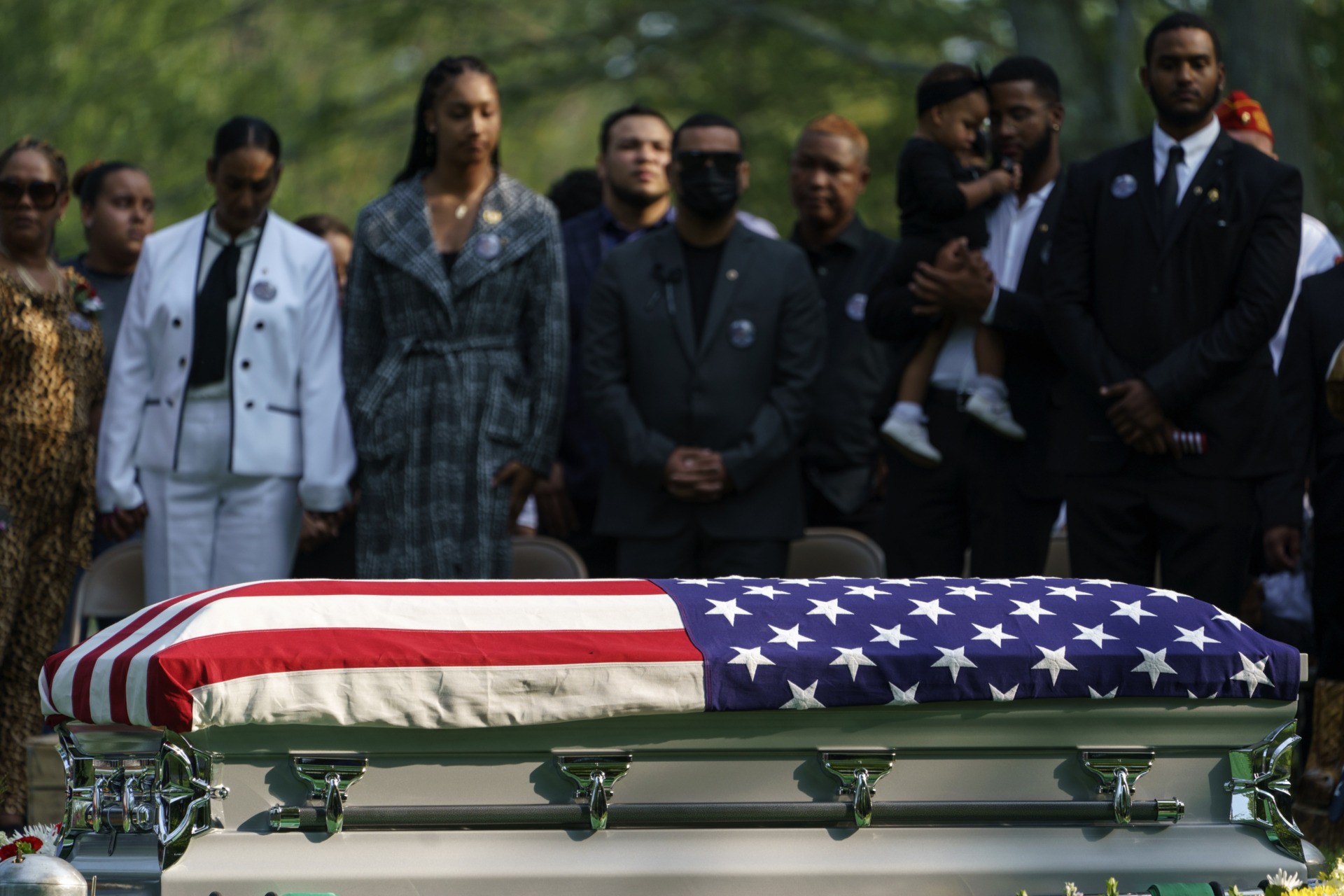
An American flag drapes the casket of Sgt. Johanny Rosario Pichardo, a U.S. Marine who was among 13 service members killed in a suicide bombing in Afghanistan, as family members look on during her burial service in Lawrence, Massachusetts, on September 14, 2021. (AP Photo/David Goldman)
To illustrate this diversity in worldview, we can recall a story from Phil Caputo, an American who fought as a U.S. Marine in Vietnam and then became a war correspondent. In 1980, Caputo traveled to Afghanistan, which had just been invaded by the Soviet Red Army. And there, in the company of the mujahideen (the predecessors, more or less, of the Taliban), he saw just how diverse were the Afghans. But let’s let Caputo tell the tale:
During the trek, I took pity on a ten-year-old boy whose bare feet had been shredded. We had to cross a log bridge spanning a mountain torrent. Certain the boy would be unable to keep his balance on the single log, I carried him over. When I deposited him on the other side, his father yanked him from my arms, slapped him, then punched me in the chest. Needless to say, his reaction shocked me. The insurgents’ leader explained that the boy had to learn to survive on his own. Because of my kindness, he would expect a stranger to come to his aid when the going got tough.
To sum up: Something an Afghan did shocked an American. At the same time, on the opposite side of the diversity looking glass, we can presume that many Afghans were shocked when they saw the U.S. embassy in Kabul flying a gay pride flag. Needless to say, in Taliban-ized Kabul, the flag’s not there anymore.
(Interestingly, there’s plenty of homosexuality in the Taliban and in Afghanistan; it’s complicated, that’s all. And that’s the point: diversity is complicated, more complicated than wearing a tee shirt, taking a knee, or pumping a fist.)
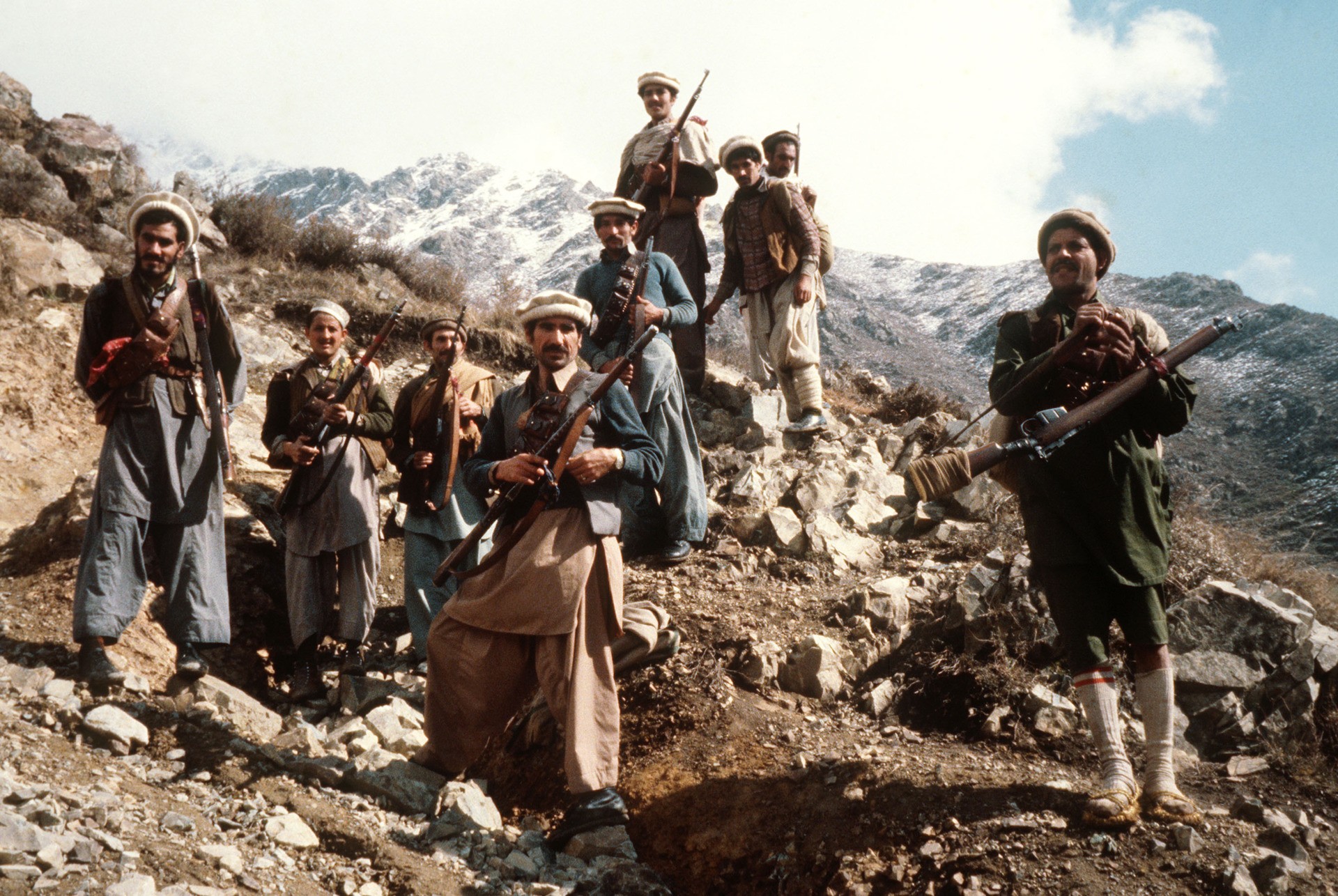
A group of Afghan anti-Soviet resistance fighters in the early 1980s. The Afghans repulsed the Soviet Union’s 1979-1989 invasion with assistance from the United States. (AFP via Getty Images)
Every American soldier who passed through Afghanistan has a story about the differences he or she encountered, and most of them speak, one way or another, to the wideness of the cultural chasm. Here’s one recollection:
I remember Afghanistan well. I deployed there twice—once in 2008, and again in 2009–2010. It was already obvious that the Taliban would sweep through the very instant we left.
In other words, the 300,000-man “army” that we had paid for was just an American fiction; it was nothing that Afghans believed in.
And here’s the voice of Vanessa Gezari, a war reporter for The Intercept:
For a generation of Afghans and Americans, this war was a very strange beast. It was a tapestry of cultural marvels, dark stories, death, destruction, beauty, suffering, friendship, regret, guilt, and official lies. The biggest lie has been about America, about what this country is in the world and about what we can and cannot do as the world’s sole superpower.
From Gezari’s description, we might see the beginnings of a colorful international mystery featuring multicultural characters—and not as the basis for a successful exercise in nation building.
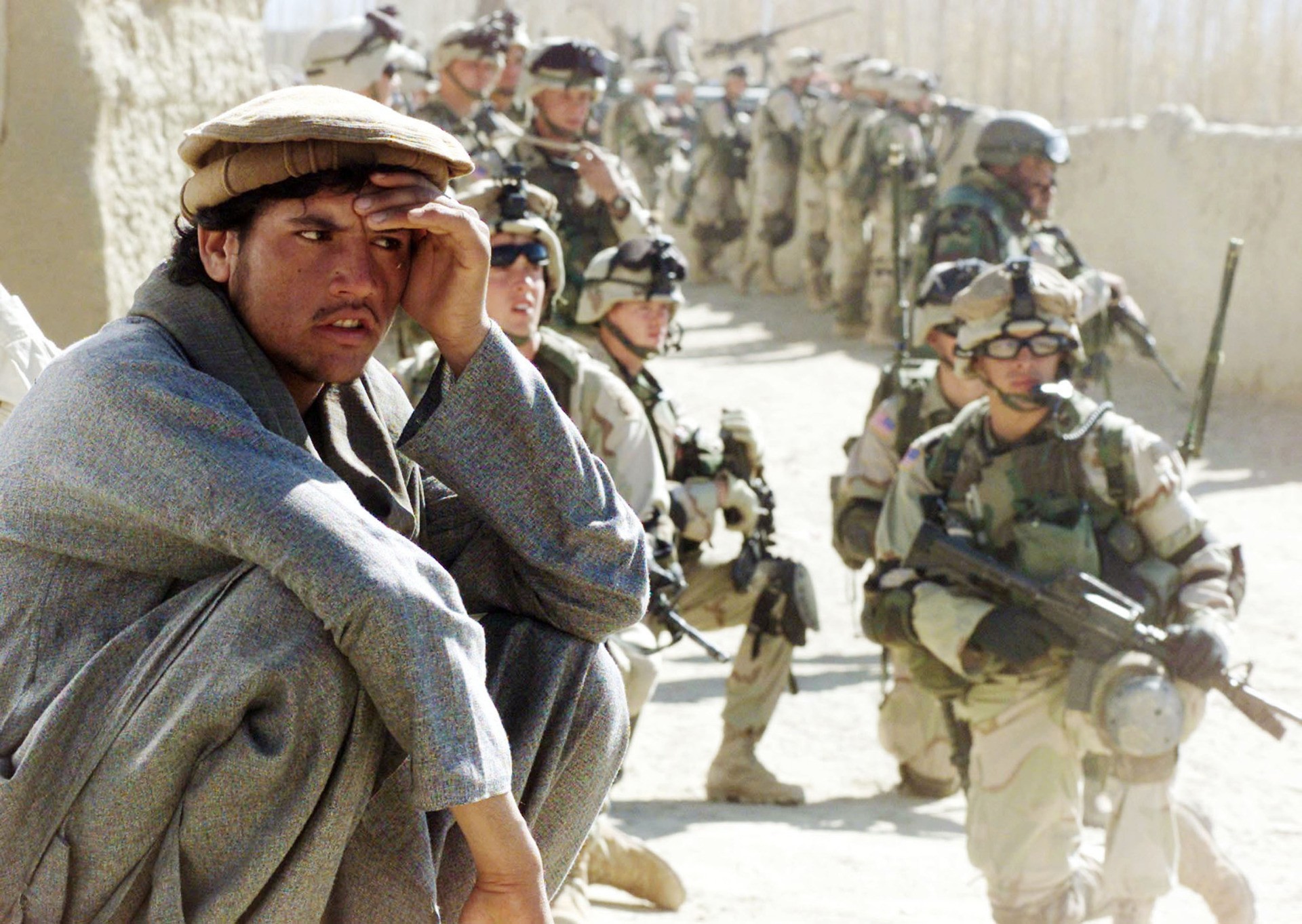
An Afghan squats on a wall while a group of U.S. soldiers from the 82nd Airborne Division secure an area during the inspection of a local bazaar on November 14, 2002, in the town of Yayeh Kehl, Paktia province, Afghanistan. (Amel Emric-Pool/Getty Images)
In the words of the American conservative Dan McCarthy, writing in the British Spectator:
For 20 years America built a Potemkin village and called it Afghanistan. Now this cardboard democracy has been trampled down in a matter of days by the Taliban. The speed and comprehensiveness of the rout cannot be explained by Joe Biden’s blunders. The war has drawn to a humiliating end not because of a weak president’s missteps in the final weeks but because the entire project was misconceived. Afghanistan was not ready for democracy and trillions of dollars in American aid could not even begin to change that fact.
An overlapping point was made by the Swedish commentator Malcom Kyeyune, who zeroed on the unproductive, even counter-productive, efforts of the highly paid technocrats and contractors who swarmed over the country these past two decades:
In very real terms, Afghanistan turned into a testbed for every single innovation in technocratic PMC [professional managerial class] governance, and each innovation was sold as the next big thing that would make previous, profane understandings of politics obsolete. In Afghanistan ”big data” and the utilization of ever expanding sets of technical and statistical metrics was allowed to topple old stodgy ideas of dead white thinkers such as Sun Tzu or Machiavelli, as ”modern” or ”scientific” approaches to war could have little to learn from the primitive insights of a pre-rational order.
We can add that similar points could be made about Iraq. Yes, we still have forces there, and yes, Saddam Hussein is gone, and yet after all that expenditure, in blood and treasure—which vastly exceeded what we spent in Afghanistan—nobody can say that Iraq is becoming like the U.S. And that’s exactly as most Iraqis want it to be. Once again: For better or worse, the world is diverse.
In other words, all the soaring American rhetoric of the last twenty years—most notably from George W. Bush with assists from a thousand neoconservative talking heads and pamphleteers—has added up to nothing. The Middle East is still the Middle East, and Central Asia is still Central Asia.
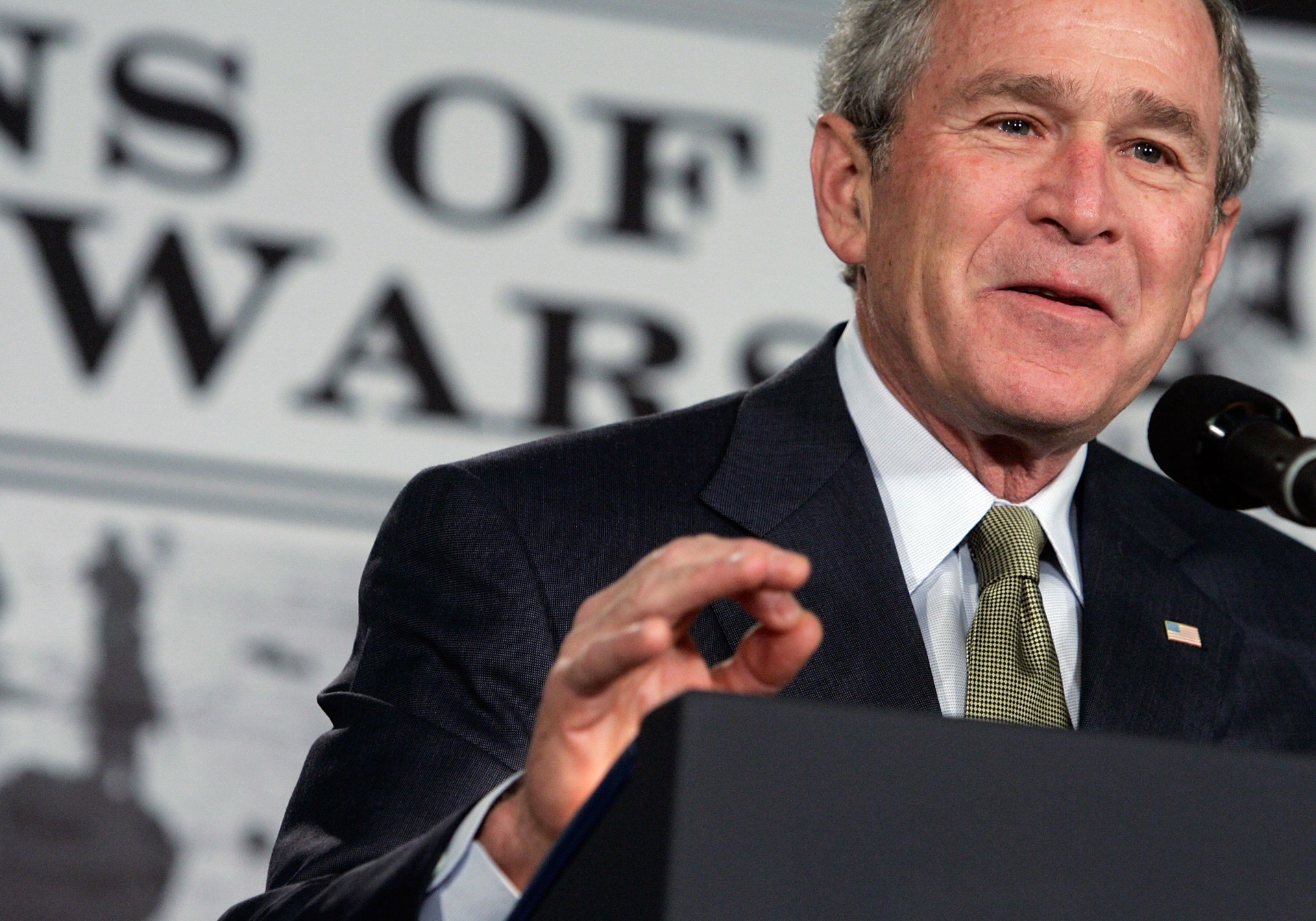
President George W. Bush speaks about democracy building in the Middle East to a group of veterans of foreign wars and wounded soldiers recuperating from action in Afghanistan and Iraq on January 10, 2006, in Washington, DC. (Alex Wong/Getty Images)
Actually, it’s even worse, because travelers to a land that they don’t understand have a way of being flimflammed. And perhaps 9/11 was one of the great epic misdirections of all time; the Middle East scholar Fawaz Gerges used discovered memos to document that the 9/11 attack was actually the result of a stratagem by a top Al Qaeda warlord, Atman al-Zawahiri, aimed at getting the United States to do exactly what it did: That is, use 9/11 as a rationale for intervening heavily all across the Middle East, thereby provoking a popular backlash among Muslims and rallying support for Al Qaeda and jihadism.
Indeed, Osama Bin Laden himself seemed to confirm this strategy in an interview with Al Jazeera in October 2001: “This battle is not between al Qaeda and the U.S. This is a battle of Muslims against the global crusaders.” That is, let’s raise the stakes far beyond Al Qaeda, so that all Muslims—including, most obviously, in Iraq—feel under assault by the Americans and their allies. (This author speculated that the U.S. was falling into just such trap in a column he write for Newsday, the Long Island newspaper, back on February 24, 2003, a month before the launching of the Iraq war.)
Oh, and by the way did we mention that al-Zawahiri, whom many thought had died in 2020, is actually still alive? That’s how little we know about the forces we’ve been fighting. No wonder we could never win.
In other words, we had no idea what we were getting ourselves into, and only now are waking up to the con.
So one is reminded of the downbeat last scene from the 1974 movie Chinatown, in which older-and-grimmer figures tell the stunned and grief-stricken Jack Nicholson character, “Go home Jake, I’m doing you a favor.” “Forget it, Jake. It’s Chinatown.”
So maybe that’s the best thing for us to say: Go home, Uncle Uncle Sam. Forget it, it’s Kabul. It’s Afghanistan.
Admittedly, these are hard thing to say after all the efforts of the last 20 years, and yet it’s better to say them after 20 years, as opposed to, say 30 years or maybe 40 years. No matter how long we might have wished to stay, the Afghans in their oppositional diversity were going to stay longer.
The Taliban were always going to win. Of course they were. After all, it’s their turf, and we were just naive strangers as baffled by mysteries today as we were two decades ago.





Comments are closed.